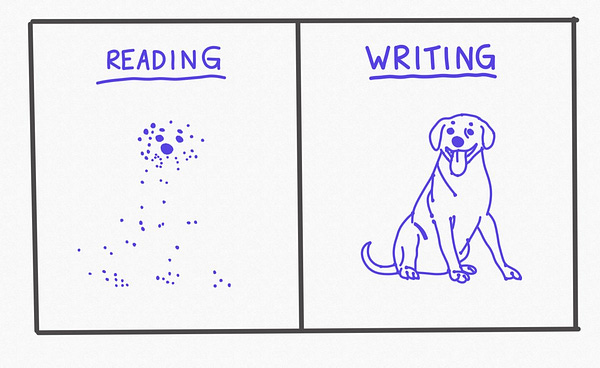This is Everything Is Amazing, a newsletter about this, arranged somewhat like that.
The intensely curious Albert Einstein once said, “Everyone is a genius. But if you judge a fish by its ability to climb a tree, it will live its whole life believing that it is stupid.”
In fact, there’s no evidence he ever said this. In the immortal words of Mark Twain, “most quotes on the internet are rubbish - and you can quote me.” But my point is that you are supremely adapted to do some things above others, and if this evening, that thing is watching England w̶i̶n almost win Euro 2021 instead of reading this newsletter, I won’t hold it against you. I trust you to make the right call here.
(After all, you’re a genius.)
By the way, you know this is a newsletter, right? The kind you could get emailed to you?
Just checking.
Okay. Today, let’s go to a country that is transforming the way its people go to work, and see what we can learn from them.
Ever heard of the 4-day work week?
It’s a thing that people tend to yell about, and usually for good reason. Last week it flooded the news cycle once again, triggered by the results of a recent study of 2,500 employees in Iceland’s government and the Reykjavík City Council.
If you were on the scheme, your weekly hours at work were cut - but you were still given exactly the same weekly wage as before. In one sense, a pay-rise…but in another, a challenge, to get at least the same amount of work done in less time, with the powerful incentive of being able to go home earlier and use that newly-minted time at home in any way you wish.
I only had the vaguest idea about how all of this worked, so I started reading around.
The term “4-day work week” is actually a bit confusing, since it includes:
working less overall hours for the same pay…
... and cramming more hours at work into less days (eg. 4 days of 10 hours each, instead of 5 days of 8 hours)…
…or the least desirable option for employer and employee alike: “sorry, because of things not being great right now, we’re making cutbacks - so we’re cutting your hours. But hey, now you get the whole of Friday off. Maybe you could get a second job?”
What’s getting the most attention, and is the subject of the Iceland study, is the type where folk are asked to work less hours for the same money. In line with many studies elsewhere, Iceland found that despite people being at work for less time, their weekly productivity either stayed the same or went up:
The trials led unions to renegotiate working patterns, and now 86% of Iceland's workforce have either moved to shorter hours for the same pay, or will gain the right to, the researchers said.
Workers reported feeling less stressed and at risk of burnout, and said their health and work-life balance had improved. They also reported having more time to spend with their families, do hobbies and complete household chores.
Will Stronge, director of research at Autonomy, said: "This study shows that the world's largest ever trial of a shorter working week in the public sector was by all measures an overwhelming success.
"It shows that the public sector is ripe for being a pioneer of shorter working weeks - and lessons can be learned for other governments."
- BBC News
Sounds great, right? Workers are happier, and companies either make a small profit (in workplace overheads) or a big one, when productivity actually goes up.
You’d think everyone would be in favour. And if that was true - why hasn’t it happened everywhere yet?
This is one of the great joys of applied curiosity: to blunder into a topic you know nothing about, openly announce your cluelessness, and ask the kind of questions someone with a tarnishable reputation would struggle to voice. It’s a bit intimidating, but in an odd sort of way it’s also a relief, to say “I don’t know” and take a step back.
It also makes it easier to listen to people (I’m with Jonny on this one) - as opposed to shouting at them, which usually has this effect:
(What really makes this for me is the person on the left.)
It’s also really, really fun to assemble all your bits of thinking and see what patterns you can spot between them - say, by writing a newsletter:
So I asked Twitter - what’s the best argument against the 4-day work week?
Some smart people were kind enough to weigh in:





(Alex is the author of Shorter, which is the next stage of my reading on this topic.)
There’s a danger here, however. Ask enough questions and you’ll get mired in alternative ways to string your thoughts together, like a series of dots that could make any animal (or car, or household object, or…) - and you just sit there, surrounded by unreadable scrawled notes containing lots of ringing and underlining, drinking too much coffee and neurologically collapsing in on yourself.
This is the subject of the greatest peer-reviewed academic article ever published:
(Yes, it’s real. Here’s the background of it.)
But generally, asking questions is a great way to learn your way into something you know nothing about. Isn’t it?
Yes. But it’s also something not everyone can do as well as they’d like - and thereby hangs a tale of privilege in action.
In her 2003 book Unequal Childhoods, sociologist Annette Lareau studies the parenting habits of 88 African American and white families over the course of a year (and follows up a decade later for the book’s 2nd edition).
You’ll probably be unsurprised to learn that children from these families took widely diverging paths into adult life, according to all sorts of factors, but particularly along socio-economic lines. Her conclusion: for most working-class or poor families, the parenting style was about instilling respect for authority, while otherwise being hands-off with a child’s free time (when you’re working every hour under the sun just to pay the bills, you just don’t have the bandwidth to structure what your kids are doing out of school).
(As luck would have it, while taking a break from writing this newsletter, I listened to Louis Theroux interviewing Boy George, and at one point the latter was talking about his upbringing: “You find that in the working-class world, there’s amazing tolerence…”)
In contrast, middle-class parents play it a different way:
“Concerted cultivation” creates adults who know how to challenge authority, navigate bureaucracy, and manage time - all skills needed to remain in the middle class.
And by “challenge authority,” the writer really means ask questions.
In his book Curious, Ian Leslie documents some of the research around this:
In 1930, developmental psychologist Dorothea McCarthy studied 140 children in Minneapolis aged between 18 & 54 months, and found the ones from upper social classes asked more questions than those in lower ones.
A detailed study of 30 girls under 5 years of age by Barbara Tizard & Martin Hughes found a similar pattern: middle-class children asked more questions, but also the type of questions they asked were different. They asked more “how” and “why” questions - and strung questions together to create “passages of intellectual search,” like a series of repeated, related interrogations of Google.
Some of the middle-class kids asked questions with a confidence that working-class parents might interpet as ‘being cheeky’:
“Why did you give that window-cleaner money, mummy?”
“Well - the window-cleaner needs money, doesn’t he?”
“Why?”
“To buy clothes for his children and food to eat.”
“But sometimes window-cleaners don’t have children.”
(etc.)
A 1992 study of 40 American families found that parents who asked fewer questions (perhaps because that’s how they’d been brought up?) were more likely to issue prohibitions: “Just do it!” “Don’t answer back!” and the like.
All of this points to the kind of inequality in questioning that’ll be no surprise to the people who suffer the most from this arrangement.
And in the words of Rakshitha Arni Ravishankar, “there’s a fine line between curiosity and microaggression” (especially in questions around social identity).
And how about stress and trauma? As Dr. Bruce Perry, psychiatrist & senior fellow of the Child Trauma Academy in Houston, Texas, notes in this podcast episode:
“Your ability to be curious and explore the world is directly related to your ability to feel safe and settled. So kids that don’t feel safe don’t want to see new things - they want to go back to things that are safe and familiar. People who feel safe get bored with what’s familiar, so they go out and explore the world - so if you come from an environment where there’s been a lot of predictability and…modern challenge…you have a more open cortex that will allow you to take advantage of [curiosity]. But if you’re under threat - people under threat aren’t very curious.”
(Hat-tip to Fiona for pointing me towards that.)
Curiosity can also be unhelpfully self-obsessed, as Sophie noted here:
“Curiosity has to come from a place inside us, that I'm curious, I want to know, I want to learn. And so it puts the focus on me. Whereas for me when I think about being interested - that's all about the other person. It's a very similar definition, isn't it? Still wanting to know or learn about someone or something - but maybe one that feels like there's a different energy there?”
(One possible antidote to this is empathic curiosity, which I’m going to talk more about soon.)
So the assumption that everyone can ask other people the exact same impertinent questions and enjoy the exact same benefits is rife with privilege - the social advantages that some people have compared to others.
This makes some online advice good in intention but really bad in execution, creating huge amounts of FOMO and shame…
I know, none of this is exactly news, but it’s definitely worth thinking about occasionally.
(For example, here’s an interesting question: What is the main reason people give advice? Psychologists seem pretty clear on this: it’s mostly about acquiring power over others. Men in particular are prone to this behaviour - and it didn’t escape my notice that the replies to my question on Twitter were almost entirely from men, although that may say more about own friend-acquiring biases than anything else.)
Yet I still firmly agree with this quote from a 6th-grader in Ian Leslie’s book:
“Just when you think you know all you need to know, you ask another question and discover how much more there is to learn.”
Just ensure you make them fully and completely your questions, asked in your way - because that’s your best shot at getting the answers that fit you best.
Thanks for reading.
ps. GO ENGLAND!!! Update: Oh well.
Images: Jon Tyson, Gary Butterfield, André Filipe, Sandy Millar,











So many things I love about this piece. Namely, that you quoted Boy George. Might I add that curiosity is a wonderful thing, but combined with listening, it's even more astounding. We don't do enough of listening in this world right now.